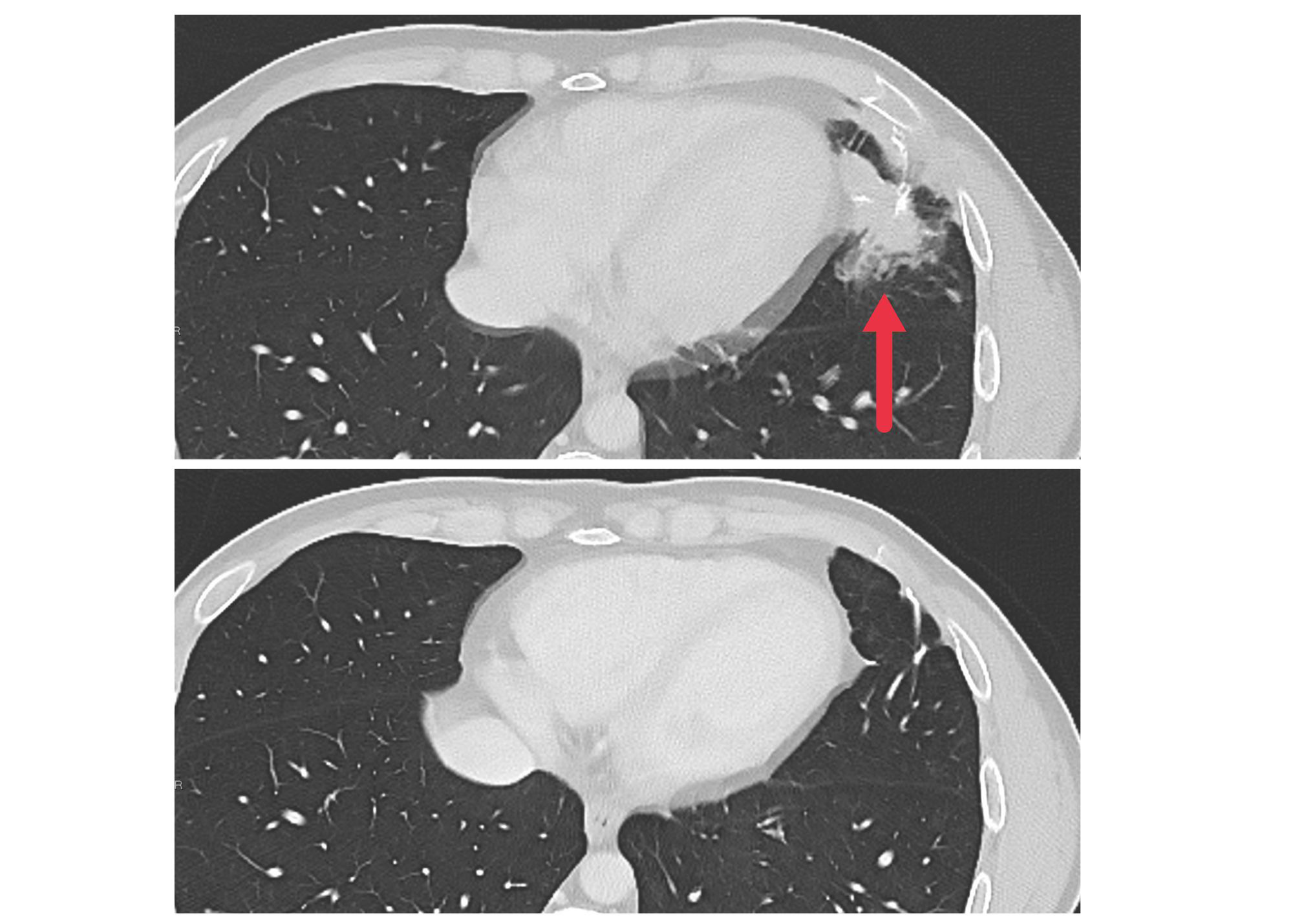
.
Press release
Thursday July 11, 2024
NIH researchers achieved tumor reduction in three out of seven colorectal patients.

Cross-sectional CT images showing metastatic cancer to the patient's left lung (top) and after treatment, no more tumor (bottom). NCI
A small clinical study has provided the first evidence of the effectiveness of cellular immunotherapy in the treatment of metastatic tumors. Researchers at the National Institutes of Health have reprogrammed patients' normal white blood cells, or lymphocytes, to make receptors that recognize and target their cancer cells. The first results come from patients with metastatic colorectal carcinoma who have already received several previous treatments. Personalized immunotherapy Some patients saw their tumors shrink The tumors could be prevented from growing for up to 7 months. These results were first published in July 2024. Nature Medicine.
A cell therapy called chimeric receptor T-cell (CAR-T) therapy has been shown to be effective in treating certain types of blood cancers. Another treatment, known as tumor-infiltrating melanoma (TIL) treatment, is also effective. According to NCI's Steven A. Rosenberg MD Ph.D., no cell therapy has been shown to be effective in treating solid tumors. Cancer Research Center Maria Parkhurst Ph.D. of the CCR Directorate of Surgery co-led this study.
The fact that Dr. Rosenberg was able to take a growing metastatic cancer and shrink it shows the promise of this new approach. It is essential to note that this is preliminary research and the method needs to be refined and tested on more robust types of cancer.
This new method overcomes the two main challenges of cellular immunotherapy, namely how to increase the number of modified T cells capable of recognizing specific cancer cells and also how to improve their ability to multiply after returning to a patient.
He and Dr. Rosenberg's colleagues collected lymphocytes from each tumor of the patients in this study. Next, they used advanced molecular characterization techniques to isolate and identify receptors called T cells that recognize specific changes within each tumor. They then genetically sequenced the receptors and used retroviruses to inject the gene for that receptor into each patient's normal lymphocytes.
In the laboratory, genetically modified lymphocytes are multiplied by hundreds of millions then infused into patients where they express the tumor's specific receptors, T lymphocytes, and continue to multiply.
Dr. Rosenberg explained that by transferring T cell receptors from a small group of cancer cells to normal lymphocytes, of which there are large numbers – a million per thimble – we can produce as many anti-cancer cells as needed.
Seven patients with metastatic colon cancer were treated with an investigational personalized cellular immunotherapy in a phase 2 study. All seven patients received multiple doses of the immunotherapy drug pembrolizumab (Keytruda) before and after cell treatment. They also received another immunotherapy called IL-2. Three patients' metastatic cancers to the liver, lungs and lymph nodes decreased significantly over a period of four to seven months. The median time to disease progression was 4.66 months.
Dr. Rosenberg pointed out that two of the three patients treated with T-cell receptors derived T cells called cytotoxic, or T cells that kill diseased cells. Dr. Rosenberg's research team explored ways to inject T cell receptors into normal lymphocyte subtypes to increase their responsiveness.
Researchers are currently studying various solid tumors, including colon cancer. This trial includes different solid tumors and is ongoing.
Rosenberg said "this is just the beginning" of the process of turning normal lymphocytes into cells that can fight solid tumors. This study proves that this is possible. “Once you see that it’s possible, you can then work to improve it.” »
The National Cancer Institute: NCI is the leader of the National Cancer Program, NIH and its efforts to reduce the prevalence of cancer and improve the lives of cancer patients. The NCI provides extramural support for a variety of cancer training and research through contracts and grants. The NCI Intramural Research Program conducts transdisciplinary and innovative basic, translational, and clinical research, as well as epidemiologic and early detection and treatment research, at the NIH Clinic Center, the largest research hospital in the world. Learn more about NCI’s intramural research. Cancer Research Center. Visit the NCI website for more information about cancer. cancer.gov Call the NCI Contact Center at 1-800-422-6237 (1-800-422 6237).
The National Institutes of Health: NIH is the medical research agency of the United States Department of Health and Human Services. It includes 27 institutes and centers. NIH, the National Medical Research Agency, is the primary federal agency that conducts and supports basic, translational, and clinical medical research. It also studies the causes, treatment and cures of common and rare diseases. Visit NIH for more information about its programs. www.nih.gov.
NIH…Transforming Discovery into Healthcare(r)
References
Parkhurst, M., Goff, SL, Lowery, FJ et al. Adoptive transfer of neoantigen-reactive personalized TCR-transduced T cells in metastatic colorectal cancer: interim results from phase 2 trial. Nat Med (2024). https://doi.org/10.1038/s41591-024-03109-0
###
